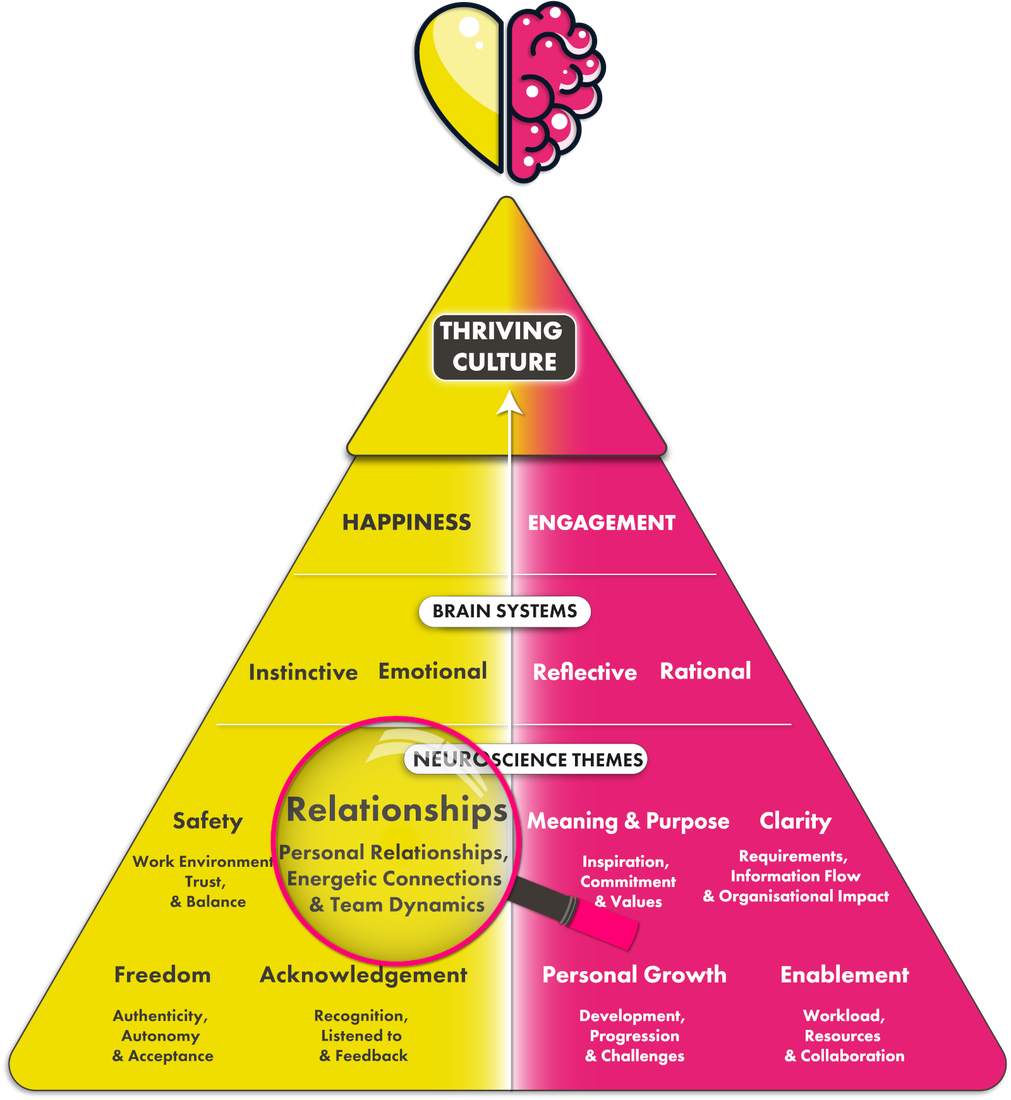Menu


Positive personal relationships are very important for our own happiness, both in the workplace and our personal lives. Unsurprisingly, relationships are linked to the Emotional brain system in our neuroscience model.
If you’ve just landed on this page, we recommend reading our introduction to brain systems and the neuroscience themes for more context. Otherwise, read on for everything you need to know about how our happiness can be dictated by personal relationships in the workplace.

Whether we are examining our emotions through a spiritual lens or as data points, we should not be afraid of naming and expressing them. Our emotions are simply tools used to inform us about what is going on inside, how we internalise things happening around us, and, most importantly, how we relate and form relationships with others.
Professor and bestselling author Brenee Brown discovered through her research most people only access three emotions: Happiness, Sadness, and Anger. Usually, these three emotions coincide with the top-level emotion, but if we dig a little deeper, there’s more nuance and more emotion present. Being able to name and report these emotions is essential in personal relationships. Understanding each other’s worlds and creating a safe space with empathy.

Every relationship has an unspoken context, but all relationships are personal. Depending on the level of intimacy in a relationship, the more or less vulnerable you are to share. Some boundaries occur differently between personal and work relationships, but all relationships have some similar qualities and dynamics. There are commonalities to creating a safe space with listening, curiosity, and empathy.
The quality of our relationships is relative to the quality of our lives. If we want good quality relationships, we have to be intentional. But we have unconscious patterns of relating because we often don’t see many healthy models of relationships. Whether in the work or personal setting, if we’re not putting intention, we’re just going to operate from the patterns of what we’ve seen and learned.
Everyone has defensive strategies or protections based on their prior experience with life and relationships. Imagine what it would be like to relate to them differently so they start to feel their opinions and experiences matter because you’ve given them the space to be heard and seen.
It’s important in a team for the leaders to have good competency around EQ and relational dynamics (which may take training or coaching) and systematising time in the schedule for intentional spaces for people to share and learn the skills of listening then reflecting back curiosity.
Whether you come from a culture or family that ignores emotions or trots them out for everyone to see, the important thing is how you speak about them in a way that owns your experience without attacking others. Then it becomes a mutually shared conversation. This is a skill, and there is an art in how to address emotions.
Imagine you walk into the conference room and recognise your colleague has a particular look or body language. You may immediately make the assumption they’re mad at you. Then taking this information before verifying it makes you reactively angry, which leads to disconnection.
Conversely, instead of creating your own narrative, you could talk with your colleague, saying “I noticed what I perceived as tension in your face or body language. The story I made up about that tension is that you are mad at me, and I felt the urge to pull away.”
Then ask them
“What’s happening for you? Can you share your experience?”
Acknowledge the story you told yourself, share it aloud, and start the conversation. The emotions get smaller and more manageable.
When you feel triggered, explore your reactions with self-awareness. Do you experience sweaty palms, a sensation of heat rising, or a quickened pulse? Typically, when we’re triggered, it’s because of external information that’s triggering an old younger part in ourselves. So when we’re triggered, it’s more the adaptive child inside us that wants to respond. It’s not from our frontal cortex (the wise adult). Breath is a beautiful tool to slow down and soothe the younger part in ourselves that wants to react defensively. Come back to your centre and breathe in the moment. Then make a different choice.
When there is a sense of belonging and psychological safety, it naturally creates a healthier organisation. Once people feel a sense of belonging, there’s a natural inclination towards a shared vision and cohesiveness. To inspire this, make it clear what’s in it for them. With so much time spent in our work life, why not have that be more meaningful and enjoyable? Making this palpable and real creates a strong WHY that people can align toward the vision of a healthier, happier workplace.
*This is an excerpt from the Happiness and Humans Podcast with Cathy Courtenay, Certified RTL, and conscious relating coach. Click here to listen to the full podcast.
Related articles
Get in touch for a quick chat with one of our experts to see how we can help you.
Take our benchmark to map where your organisation is now, and where it needs to be.